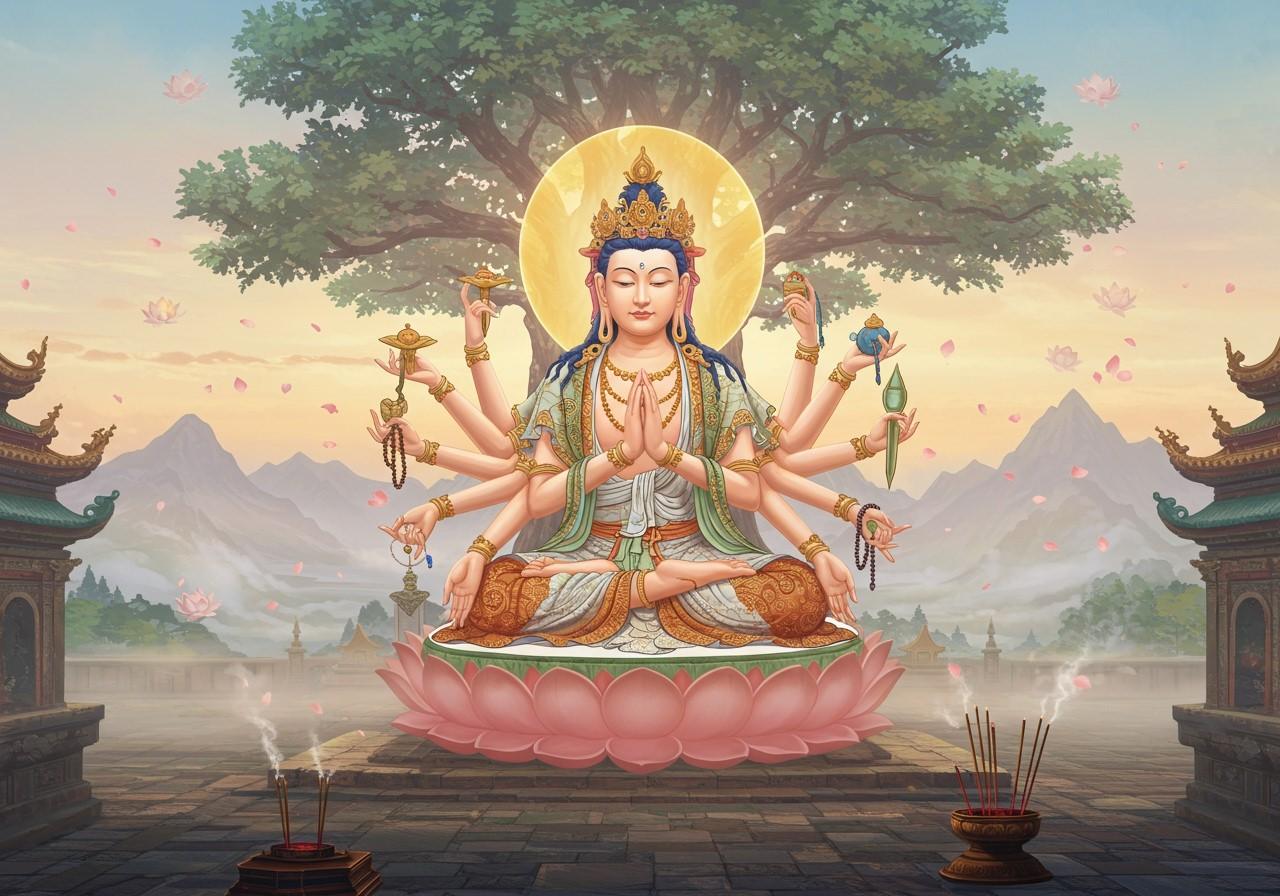
Mahayana Buddhism, a prominent branch of Buddhism that flourished around the beginning of the Common Era, offers a rich tapestry of beliefs and practices centered around the Bodhisattva Ideal. This ideal emphasizes compassion and the pursuit of enlightenment for the benefit of all beings. Understanding this concept is crucial to appreciating its influence on Buddhist traditions and community life, particularly in Central and East Asia where it holds a dominant influence. Various schools like Pure Land Buddhism, emphasizing faith in Amitabha Buddha, and Zen Buddhism, focusing on meditation, fall under the umbrella of Mahayana Buddhism. The transfer of merit, sharing good karma, further distinguishes this sect.
Defining the Bodhisattva Ideal
In Mahayana Buddhism, a Bodhisattva is an individual striving for enlightenment not only for personal gain but for the well-being of all. The term itself combines ‘bodhi’ (enlightenment) and ‘sattva’ (being). This path is guided by six perfections (paramitas):
- Generosity (Dana): This involves selfless giving, not just materially but also sharing knowledge and offering emotional support, reflecting the Bodhisattva’s commitment to others’ well-being.
- Morality (Sila): Ethical conduct and adherence to moral principles form the foundation of a Bodhisattva’s actions, ensuring their deeds benefit rather than harm others.
- Patience (Ksanti): Cultivating patience in the face of adversity is essential, allowing Bodhisattvas to remain steadfast in their commitment to helping others even when faced with challenges.
- Energy (Virya): With unwavering diligence, Bodhisattvas dedicate themselves to their practice and the pursuit of enlightenment for all, demonstrating continuous effort and dedication.
- Meditation (Dhyana): Through meditative practices, Bodhisattvas cultivate inner peace and clarity, strengthening their ability to connect with and understand the suffering of others.
- Wisdom (Prajna): This signifies the profound understanding of reality, allowing Bodhisattvas to perceive the interconnectedness of all beings and act with wisdom and compassion.
Unlike Theravada Buddhism’s Arhat, who focuses on individual enlightenment, the Bodhisattva postpones their own complete enlightenment to assist others on their spiritual journeys.
The Role of Bodhisattvas in Mahayana Buddhism
Bodhisattvas are not just spiritual guides but profound sources of inspiration in Mahayana Buddhism. They embody the highest virtues and altruistic intentions, serving as exemplars for practitioners. The Bodhisattva vow, a commitment to achieving enlightenment for the benefit of all, distinguishes them. Key figures like Avalokiteshvara (compassion) and Manjushri (wisdom) exemplify these ideals.
Mahayana Buddhism Core Principles
Sunyata (emptiness) is a central principle, shaping the Bodhisattva’s understanding of self and reality. Upaya (skillful means) empowers them to utilize practical methods to aid others. Karuna (compassion) and Prajna (wisdom) are fundamental pillars of the Bodhisattva’s path.
Cultural and Ritual Significance
The Bodhisattva Ideal is deeply woven into the cultural and ritual fabric of Mahayana Buddhism, especially within Indian traditions. Statues, art, and literature reflect these ideals. They feature prominently in temples, homes, festivals, and community events. Online platforms now extend access to a broader audience.
Modern Relevance and Practice
The Bodhisattva Ideal remains highly relevant today. Online resources provide access to Mahayana teachings, facilitating integration into modern life. Mindfulness and compassion-based practices inspired by the Bodhisattva path are gaining popularity, promoting personal growth and well-being.
How Poojn.in Supports Your Buddhist Practice
Poojn.in offers a wide selection of items to support your Buddhist practice:
Prayer and Meditation Supplies:
- Meditation Cushions: Find the perfect cushion to support your posture during meditation at Poojn.in.
- Mala Beads: Enhance your mantra recitation with traditional Buddhist prayer beads available here.
- Incense Holders and Incense Sticks: Create a serene atmosphere with our pure copper and brass incense holders and natural incense sticks, perfect for enhancing your meditation practice.
Ritual Items:
- Buddha Statues: Poojn.in offers authentic Buddha statues in various sizes, perfect for creating a sacred space in your home.
- Bells and Singing Bowls: Deepen your practice with traditional Buddhist bells and singing bowls, ideal for rituals and meditation.
- Meditation Shawls and Offering Bowls: Enhance your meditation practice with pure cotton meditation shawls and ceremonial offering bowls available on our website.
Visit Poojn.in for a complete selection and secure delivery across India. *Note: Product availability may vary.*
Embracing the Bodhisattva Path
The Bodhisattva Ideal serves as a guiding light in Mahayana Buddhism, encouraging compassion and wisdom in daily life. By understanding and practicing these principles, we connect with our spiritual and cultural heritage. In today’s world, this path offers timeless wisdom that integrates seamlessly with modern living. Online platforms make these teachings readily accessible.
FAQs on The Bodhisattva Ideal
What is the Bodhisattva Ideal? It’s the Mahayana Buddhist path of seeking enlightenment for all beings, delaying personal enlightenment to help others.
Who can become a Bodhisattva? Anyone with the commitment to compassion, wisdom, and helping others can aspire to this path.
Why is the Bodhisattva Ideal important? It emphasizes compassion, altruism, and working towards the welfare of others for spiritual growth.
How does the Mahayana Bodhisattva concept differ from other traditions? Mahayana prioritizes universal salvation, while other traditions may focus on individual enlightenment.
Examples of Bodhisattvas? Avalokiteshvara (compassion) and Manjushri (wisdom) are key figures.
How to practice the Bodhisattva path daily? Through acts of kindness, patience, wisdom, and mindfulness of others’ needs.
Bodhisattvas’ role in Mahayana rituals? They are invoked for blessings and guidance, inspiring practitioners.
How does the Ideal influence Mahayana teachings? It promotes collective liberation, shaping practices and philosophies towards selfless living.


